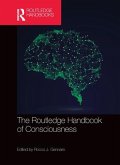The Routledge Handbook of Philosophy of Animal Minds
Herausgeber: Andrews, Kristin; Beck, Jacob
The Routledge Handbook of Philosophy of Animal Minds
Herausgeber: Andrews, Kristin; Beck, Jacob
- Gebundenes Buch
- Merkliste
- Auf die Merkliste
- Bewerten Bewerten
- Teilen
- Produkt teilen
- Produkterinnerung
- Produkterinnerung
The Routledge Handbook of Animal Cognition is an outstanding reference source to the key topics, problems and debates in this exciting subject and is the first collection of its kind. Essential reading for students and researchers in philosophy of mind, philosophy of psychology, ethics and related disciplines such as ethology, biology, psychology, linguistics and anthropology.
Andere Kunden interessierten sich auch für
![The Routledge Handbook of Consciousness The Routledge Handbook of Consciousness]() The Routledge Handbook of Consciousness70,99 €
The Routledge Handbook of Consciousness70,99 €![The Routledge Handbook of Philosophy and Science of Addiction The Routledge Handbook of Philosophy and Science of Addiction]() The Routledge Handbook of Philosophy and Science of Addiction71,99 €
The Routledge Handbook of Philosophy and Science of Addiction71,99 €![The Routledge Handbook of Embodied Cognition The Routledge Handbook of Embodied Cognition]() The Routledge Handbook of Embodied Cognition76,99 €
The Routledge Handbook of Embodied Cognition76,99 €![The Routledge Handbook of Bodily Awareness The Routledge Handbook of Bodily Awareness]() The Routledge Handbook of Bodily Awareness246,99 €
The Routledge Handbook of Bodily Awareness246,99 €![The Routledge Handbook of Feminist Philosophy of Science The Routledge Handbook of Feminist Philosophy of Science]() The Routledge Handbook of Feminist Philosophy of Science41,99 €
The Routledge Handbook of Feminist Philosophy of Science41,99 €![The Routledge Handbook of Neoplatonism The Routledge Handbook of Neoplatonism]() The Routledge Handbook of Neoplatonism72,99 €
The Routledge Handbook of Neoplatonism72,99 €![The Routledge Handbook of the Stoic Tradition The Routledge Handbook of the Stoic Tradition]() The Routledge Handbook of the Stoic Tradition70,99 €
The Routledge Handbook of the Stoic Tradition70,99 €-
-
-
The Routledge Handbook of Animal Cognition is an outstanding reference source to the key topics, problems and debates in this exciting subject and is the first collection of its kind. Essential reading for students and researchers in philosophy of mind, philosophy of psychology, ethics and related disciplines such as ethology, biology, psychology, linguistics and anthropology.
Hinweis: Dieser Artikel kann nur an eine deutsche Lieferadresse ausgeliefert werden.
Hinweis: Dieser Artikel kann nur an eine deutsche Lieferadresse ausgeliefert werden.
Produktdetails
- Produktdetails
- Routledge Handbooks in Philosophy
- Verlag: Taylor & Francis Ltd
- Seitenzahl: 522
- Erscheinungstermin: 1. Oktober 2017
- Englisch
- Abmessung: 183mm x 254mm x 36mm
- Gewicht: 1116g
- ISBN-13: 9781138822887
- ISBN-10: 1138822884
- Artikelnr.: 43676107
- Herstellerkennzeichnung
- Libri GmbH
- Europaallee 1
- 36244 Bad Hersfeld
- gpsr@libri.de
- Routledge Handbooks in Philosophy
- Verlag: Taylor & Francis Ltd
- Seitenzahl: 522
- Erscheinungstermin: 1. Oktober 2017
- Englisch
- Abmessung: 183mm x 254mm x 36mm
- Gewicht: 1116g
- ISBN-13: 9781138822887
- ISBN-10: 1138822884
- Artikelnr.: 43676107
- Herstellerkennzeichnung
- Libri GmbH
- Europaallee 1
- 36244 Bad Hersfeld
- gpsr@libri.de
Kristin Andrews is York Research Chair in Animal Minds in the Department of Philosophy at York University in Toronto, Canada, and is the author of two books: Do Apes Read Minds? Toward a New Folk Psychology (2012) and The Animal Mind (Routledge 2015). Jacob Beck is an Associate Professor of Philosophy and member of the Centre for Vision Research at York University in Toronto, Canada.
Introduction, Kristin Andrews and Jacob Beck
Part I: Mental representation
1. Arthropod intentionality? Andrew Knoll and Georges Rey
2. Visual imagery in the thought of monkeys and apes Christopher Gauker
3. Maps in the head? Michael Rescorla
4. Do nonhuman animals have a language of thought? Jacob Beck
5. Animal minds in time: the question of episodic memory Christoph Hoerl
and Teresa McCormack
6. Novel colours in animal perception Mohan Matthen
7. Color manipulation and comparative color: they're not all compatible
Derek H. Brown
Part II: Reasoning and metacognition
8. Animal rationality and belief Hans-Johann Glock
9. Instrumental reasoning in nonhuman animals Elisabeth Camp and Eli Shupe
10. A different kind of mind? Matthew Boyle
11. Can non-linguistic animals think about thinking? José Luis Bermúdez
12. On psychological explanations and self-concepts (in some animals) Eric
Saidel
13. Non-human metacognition Joëlle Proust
Part III: Consciousness
14. So that's what it's like! Sean Allen-Hermanson
15. Do fish have feelings? Michael Tye
16. The unpleasantness of pain for nonhuman animals Adam Shriver
17. Attention, working memory, and animal consciousness Jesse Prinz
18. Animal consciousness and higher-order thoughts. Rocco Gennaro
19. Minds and bodies in animal evolution Michael Trestman
20. The evolution of consciousness in phylogenetic context Peter
Godfrey-Smith
Part IV: Mindreading
21. Animal mindreading: the problem and how it can be solved Robert Lurz
22. What apes know about seeing Marta Halina
23. Using causal models to think about mindreading Hayley Clatterbuck
24. Do chimpanzees reason about belief ? Kristin Andrews
25. Tracking and representing others' mental states Stephen A. Butterfill
26. From false beliefs to true interactions: are chimpanzees socially
enactive? Sarah Vincent and Shaun Gallagher
Part V: Communication
27. Pragmatic interpretation and signaler-receiver asymmetries in animal
communication Dorit Bar-On and Richard Moore
28. Communicative intentions, expressive communication, and origins of
meaning Dorit Bar-On
29. How much mentality is needed for meaning? Mitchell S. Green
30. The content of animal signals Ulrich Stegmann
31. Intentionality and flexibility in animal communication Christine
Sievers, Markus Wild, and Thibaud Gruber
Part VI: Social cognition and culture
32. What is animal culture? Grant Ramsey
33. Varieties of culture Grant Goodrich
34. Animal traditions: what they are, and why they matter Rachael L. Brown
35. Primates are touched by your concern: touch, emotion, and social
cognition in chimpanzees Maria Botero
36. Do chimpanzees conform to social norms? Laura Schlingloff and Richard
Moore
37. Kinds of collective behavior and the possibility of group minds Bryce
Huebner
Part VI: Association, simplicity, and modeling
38. Associative learning Colin Allen
39. Understanding associative and cognitive explanations in comparative
psychology Cameron Buckner
40. A new view of association and associative models Michael Dacey
41. Simplicity and cognitive models: avoiding old mistakes in new
experimental contexts Irina Mikhalevich
42. Against Morgan's Canon Simon Fitzpatrick
43. A bridge too far? Inference and extrapolation from model organisms in
neuroscience David Michael Kaplan
Part VIII: Ethics
44. Animals and ethics, agents and patients Dale Jamieson
45. Moral subjects Mark Rowlands
46. Decisional authority and animal research subjects Andrew Fenton
47. Empathy in mind Lori Gruen
48. Using, owning, and exploiting animals Alasdair Cochrane
49. Animal mind and animal ethics Bernard Rollin.
Index
Part I: Mental representation
1. Arthropod intentionality? Andrew Knoll and Georges Rey
2. Visual imagery in the thought of monkeys and apes Christopher Gauker
3. Maps in the head? Michael Rescorla
4. Do nonhuman animals have a language of thought? Jacob Beck
5. Animal minds in time: the question of episodic memory Christoph Hoerl
and Teresa McCormack
6. Novel colours in animal perception Mohan Matthen
7. Color manipulation and comparative color: they're not all compatible
Derek H. Brown
Part II: Reasoning and metacognition
8. Animal rationality and belief Hans-Johann Glock
9. Instrumental reasoning in nonhuman animals Elisabeth Camp and Eli Shupe
10. A different kind of mind? Matthew Boyle
11. Can non-linguistic animals think about thinking? José Luis Bermúdez
12. On psychological explanations and self-concepts (in some animals) Eric
Saidel
13. Non-human metacognition Joëlle Proust
Part III: Consciousness
14. So that's what it's like! Sean Allen-Hermanson
15. Do fish have feelings? Michael Tye
16. The unpleasantness of pain for nonhuman animals Adam Shriver
17. Attention, working memory, and animal consciousness Jesse Prinz
18. Animal consciousness and higher-order thoughts. Rocco Gennaro
19. Minds and bodies in animal evolution Michael Trestman
20. The evolution of consciousness in phylogenetic context Peter
Godfrey-Smith
Part IV: Mindreading
21. Animal mindreading: the problem and how it can be solved Robert Lurz
22. What apes know about seeing Marta Halina
23. Using causal models to think about mindreading Hayley Clatterbuck
24. Do chimpanzees reason about belief ? Kristin Andrews
25. Tracking and representing others' mental states Stephen A. Butterfill
26. From false beliefs to true interactions: are chimpanzees socially
enactive? Sarah Vincent and Shaun Gallagher
Part V: Communication
27. Pragmatic interpretation and signaler-receiver asymmetries in animal
communication Dorit Bar-On and Richard Moore
28. Communicative intentions, expressive communication, and origins of
meaning Dorit Bar-On
29. How much mentality is needed for meaning? Mitchell S. Green
30. The content of animal signals Ulrich Stegmann
31. Intentionality and flexibility in animal communication Christine
Sievers, Markus Wild, and Thibaud Gruber
Part VI: Social cognition and culture
32. What is animal culture? Grant Ramsey
33. Varieties of culture Grant Goodrich
34. Animal traditions: what they are, and why they matter Rachael L. Brown
35. Primates are touched by your concern: touch, emotion, and social
cognition in chimpanzees Maria Botero
36. Do chimpanzees conform to social norms? Laura Schlingloff and Richard
Moore
37. Kinds of collective behavior and the possibility of group minds Bryce
Huebner
Part VI: Association, simplicity, and modeling
38. Associative learning Colin Allen
39. Understanding associative and cognitive explanations in comparative
psychology Cameron Buckner
40. A new view of association and associative models Michael Dacey
41. Simplicity and cognitive models: avoiding old mistakes in new
experimental contexts Irina Mikhalevich
42. Against Morgan's Canon Simon Fitzpatrick
43. A bridge too far? Inference and extrapolation from model organisms in
neuroscience David Michael Kaplan
Part VIII: Ethics
44. Animals and ethics, agents and patients Dale Jamieson
45. Moral subjects Mark Rowlands
46. Decisional authority and animal research subjects Andrew Fenton
47. Empathy in mind Lori Gruen
48. Using, owning, and exploiting animals Alasdair Cochrane
49. Animal mind and animal ethics Bernard Rollin.
Index
Introduction, Kristin Andrews and Jacob Beck
Part I: Mental representation
1. Arthropod intentionality? Andrew Knoll and Georges Rey
2. Visual imagery in the thought of monkeys and apes Christopher Gauker
3. Maps in the head? Michael Rescorla
4. Do nonhuman animals have a language of thought? Jacob Beck
5. Animal minds in time: the question of episodic memory Christoph Hoerl
and Teresa McCormack
6. Novel colours in animal perception Mohan Matthen
7. Color manipulation and comparative color: they're not all compatible
Derek H. Brown
Part II: Reasoning and metacognition
8. Animal rationality and belief Hans-Johann Glock
9. Instrumental reasoning in nonhuman animals Elisabeth Camp and Eli Shupe
10. A different kind of mind? Matthew Boyle
11. Can non-linguistic animals think about thinking? José Luis Bermúdez
12. On psychological explanations and self-concepts (in some animals) Eric
Saidel
13. Non-human metacognition Joëlle Proust
Part III: Consciousness
14. So that's what it's like! Sean Allen-Hermanson
15. Do fish have feelings? Michael Tye
16. The unpleasantness of pain for nonhuman animals Adam Shriver
17. Attention, working memory, and animal consciousness Jesse Prinz
18. Animal consciousness and higher-order thoughts. Rocco Gennaro
19. Minds and bodies in animal evolution Michael Trestman
20. The evolution of consciousness in phylogenetic context Peter
Godfrey-Smith
Part IV: Mindreading
21. Animal mindreading: the problem and how it can be solved Robert Lurz
22. What apes know about seeing Marta Halina
23. Using causal models to think about mindreading Hayley Clatterbuck
24. Do chimpanzees reason about belief ? Kristin Andrews
25. Tracking and representing others' mental states Stephen A. Butterfill
26. From false beliefs to true interactions: are chimpanzees socially
enactive? Sarah Vincent and Shaun Gallagher
Part V: Communication
27. Pragmatic interpretation and signaler-receiver asymmetries in animal
communication Dorit Bar-On and Richard Moore
28. Communicative intentions, expressive communication, and origins of
meaning Dorit Bar-On
29. How much mentality is needed for meaning? Mitchell S. Green
30. The content of animal signals Ulrich Stegmann
31. Intentionality and flexibility in animal communication Christine
Sievers, Markus Wild, and Thibaud Gruber
Part VI: Social cognition and culture
32. What is animal culture? Grant Ramsey
33. Varieties of culture Grant Goodrich
34. Animal traditions: what they are, and why they matter Rachael L. Brown
35. Primates are touched by your concern: touch, emotion, and social
cognition in chimpanzees Maria Botero
36. Do chimpanzees conform to social norms? Laura Schlingloff and Richard
Moore
37. Kinds of collective behavior and the possibility of group minds Bryce
Huebner
Part VI: Association, simplicity, and modeling
38. Associative learning Colin Allen
39. Understanding associative and cognitive explanations in comparative
psychology Cameron Buckner
40. A new view of association and associative models Michael Dacey
41. Simplicity and cognitive models: avoiding old mistakes in new
experimental contexts Irina Mikhalevich
42. Against Morgan's Canon Simon Fitzpatrick
43. A bridge too far? Inference and extrapolation from model organisms in
neuroscience David Michael Kaplan
Part VIII: Ethics
44. Animals and ethics, agents and patients Dale Jamieson
45. Moral subjects Mark Rowlands
46. Decisional authority and animal research subjects Andrew Fenton
47. Empathy in mind Lori Gruen
48. Using, owning, and exploiting animals Alasdair Cochrane
49. Animal mind and animal ethics Bernard Rollin.
Index
Part I: Mental representation
1. Arthropod intentionality? Andrew Knoll and Georges Rey
2. Visual imagery in the thought of monkeys and apes Christopher Gauker
3. Maps in the head? Michael Rescorla
4. Do nonhuman animals have a language of thought? Jacob Beck
5. Animal minds in time: the question of episodic memory Christoph Hoerl
and Teresa McCormack
6. Novel colours in animal perception Mohan Matthen
7. Color manipulation and comparative color: they're not all compatible
Derek H. Brown
Part II: Reasoning and metacognition
8. Animal rationality and belief Hans-Johann Glock
9. Instrumental reasoning in nonhuman animals Elisabeth Camp and Eli Shupe
10. A different kind of mind? Matthew Boyle
11. Can non-linguistic animals think about thinking? José Luis Bermúdez
12. On psychological explanations and self-concepts (in some animals) Eric
Saidel
13. Non-human metacognition Joëlle Proust
Part III: Consciousness
14. So that's what it's like! Sean Allen-Hermanson
15. Do fish have feelings? Michael Tye
16. The unpleasantness of pain for nonhuman animals Adam Shriver
17. Attention, working memory, and animal consciousness Jesse Prinz
18. Animal consciousness and higher-order thoughts. Rocco Gennaro
19. Minds and bodies in animal evolution Michael Trestman
20. The evolution of consciousness in phylogenetic context Peter
Godfrey-Smith
Part IV: Mindreading
21. Animal mindreading: the problem and how it can be solved Robert Lurz
22. What apes know about seeing Marta Halina
23. Using causal models to think about mindreading Hayley Clatterbuck
24. Do chimpanzees reason about belief ? Kristin Andrews
25. Tracking and representing others' mental states Stephen A. Butterfill
26. From false beliefs to true interactions: are chimpanzees socially
enactive? Sarah Vincent and Shaun Gallagher
Part V: Communication
27. Pragmatic interpretation and signaler-receiver asymmetries in animal
communication Dorit Bar-On and Richard Moore
28. Communicative intentions, expressive communication, and origins of
meaning Dorit Bar-On
29. How much mentality is needed for meaning? Mitchell S. Green
30. The content of animal signals Ulrich Stegmann
31. Intentionality and flexibility in animal communication Christine
Sievers, Markus Wild, and Thibaud Gruber
Part VI: Social cognition and culture
32. What is animal culture? Grant Ramsey
33. Varieties of culture Grant Goodrich
34. Animal traditions: what they are, and why they matter Rachael L. Brown
35. Primates are touched by your concern: touch, emotion, and social
cognition in chimpanzees Maria Botero
36. Do chimpanzees conform to social norms? Laura Schlingloff and Richard
Moore
37. Kinds of collective behavior and the possibility of group minds Bryce
Huebner
Part VI: Association, simplicity, and modeling
38. Associative learning Colin Allen
39. Understanding associative and cognitive explanations in comparative
psychology Cameron Buckner
40. A new view of association and associative models Michael Dacey
41. Simplicity and cognitive models: avoiding old mistakes in new
experimental contexts Irina Mikhalevich
42. Against Morgan's Canon Simon Fitzpatrick
43. A bridge too far? Inference and extrapolation from model organisms in
neuroscience David Michael Kaplan
Part VIII: Ethics
44. Animals and ethics, agents and patients Dale Jamieson
45. Moral subjects Mark Rowlands
46. Decisional authority and animal research subjects Andrew Fenton
47. Empathy in mind Lori Gruen
48. Using, owning, and exploiting animals Alasdair Cochrane
49. Animal mind and animal ethics Bernard Rollin.
Index








